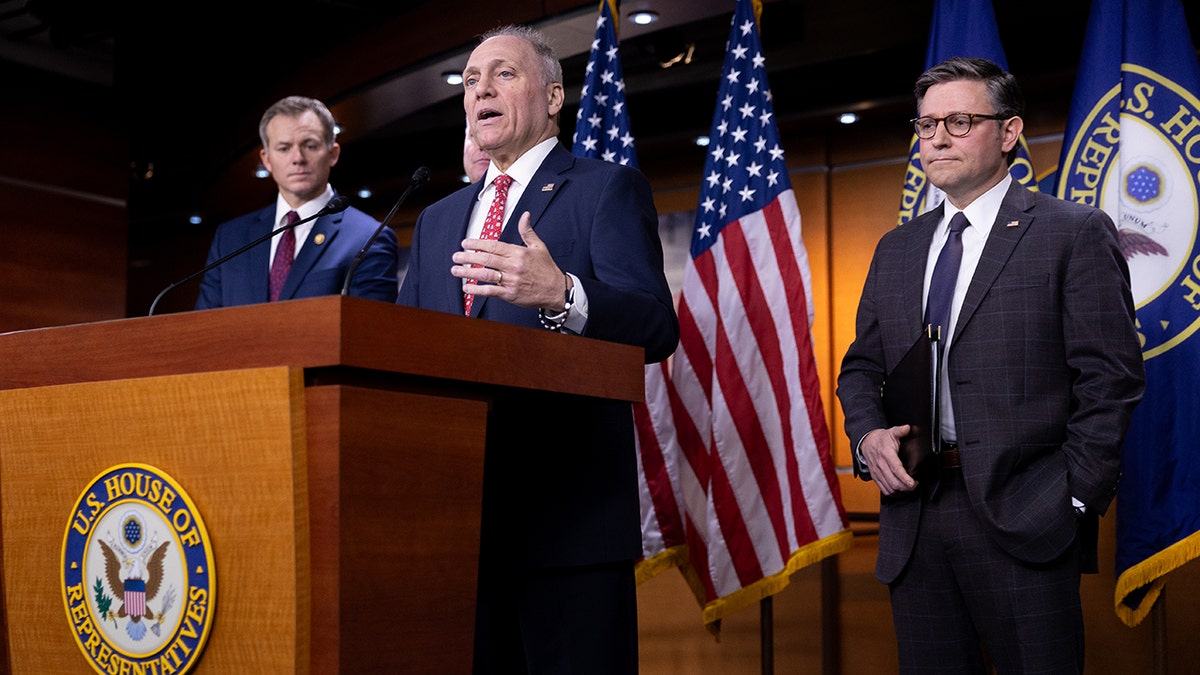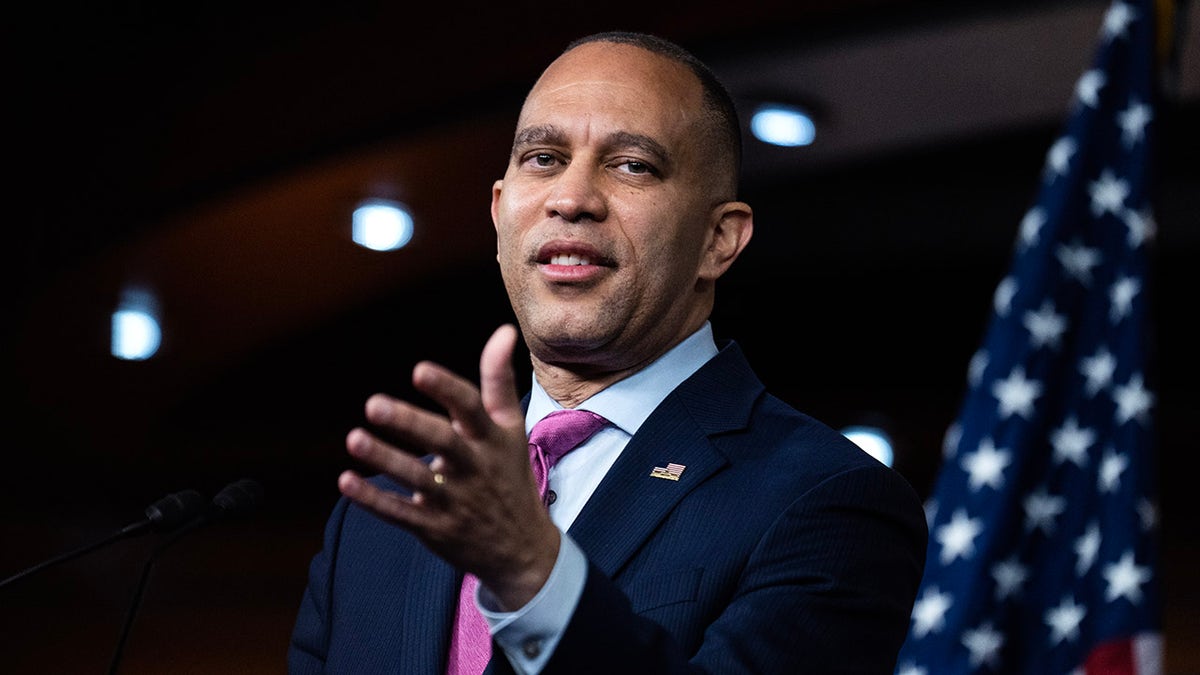It has long been said that Congress is a lot like a school.
What's the first thing they do at school? Take participation.
It's something they generally don't do it in Congress.
But they might do it next year.
FAMILIAR FACES, FAMILIAR PLACES: THE LATEST FROM CAPITOL HILL
Determining who is in and who is out will become one of the most dramatic daily events on Capitol Hill.
It's still about math on Capitol Hill.
But the 119th Congress Really talk about mathematics.
Each day in the House will depend on who is sick. Who has a parent/teacher conference. Whose plane was delayed due to snow. Who just skips school and is unreliable. The one who was giving a speech downtown got stuck in traffic and simply didn't make it back in time. Whose child stars in the school play. Whose aunt died.
President Trump and House Republicans have big plans for their 2025 legislative agenda. But the tiny size of the Republican majority could temper those day-to-day expectations.

House Majority Leader Steve Scalise (R-LA) speaks during a press conference with other House Republican leaders at the U.S. Capitol in Washington DC, U.S., November 19 2024. (Posner/Anadolu via Getty Images)
It will be interesting to see what the Republicans can implement.
The Republicans will likely start the new year with a majority of 219 votes to 215. That's 434 seats. There is a vacancy since former Rep. Matt Gaetz, R-Fla., resigned. This represents a margin of four seats. But in reality, this means that the Republican majority can only tolerate one Republican defector on each roll call vote without needing help from the other side. A Republican “no” is 218-216. But two Republican rebels result in a tie 217-217. Typically, ties are lost in the House.
But the start of the new Congress on January 3 could represent Halycon days for the House Republican Conference.
Reps. Elise Stefanik, R-N.Y., and Michael Waltz, R-Fla., plan to resign in January to join the Trump administration. Stefanik is a candidate for Ambassador to the United Nations and needs confirmation for this position. The president-elect named Waltz as national security adviser. This position is not subject to Senate confirmation. The Republican majority will therefore fall to 217-215. At this point, The Republicans cannot lose any votes to pass their program.
THE Hitchhiker's Guide to GAETZ'S STATUS AT HOME AND THE ETHICS COMMITTEE'S REPORT
That's a problem for House Republicans, who regularly have a squadron of defectors — from keeping the government open to impeaching Homeland Security Secretary Alejandro Mayorkas. It could even pose problems for House Speaker Mike Johnson, R-La., back in the president's suite. Johnson must secure an absolute majority of all House members who will vote when the new Congress meets on Jan. 3 to become president. He will have a little leeway at the start of the new Congress. But it won't be much. House Republicans are still suffering from political PTSD after the 15 rounds it took to elect former House Speaker Kevin McCarthy, R-Calif., early last year.
Yes. There will be special elections to fill the seats of Gaetz, Stefanik and Waltz. Florida Gov. Ron DeSantis (R) has already called a special election for Gaetz's seat on April 1.
You can't make this stuff up.

U.S. Rep. Matt Gaetz (R-FL) greets on stage on day three of the Republican National Convention at Fiserv Forum July 17, 2024 in Milwaukee, Wisconsin. (Leon Neal/Getty Images)
The other special elections are months away because Stefanik and Waltz have not yet resigned. In fact, if Stefanik is confirmed and resigns at the end of January, it may be May before there is a special election for her seat – based on New York law and the discretion granted to the New York governor , Kathy Hochul (D).
Special election results sometimes produce “special” results. The usual electorate periodically stays home and the party opposite wins these seats in off-cycle elections. So, even if these are “Republican” seats, there is no guarantee that the Republicans will automatically win.
But if things go as planned, Republicans will reclaim those seats in a few months, with a relatively solid majority of 220 to 215. That means Republicans can lose as many as two votes on any major issue.
But there are always absences. Always resignations.
And it's not limited to the Republican side of the aisle.
SPRINT TO CONFIRM TRUMP NOMINEES STARTS IN JANUARY
There have long been concerns about the health and attendance of Rep. David Scott, D-Ga., 79, the top Democrat on the House Agriculture Committee. Scott was criticized earlier this year for his lack of public appearances and interviews.
Rep. Raul Grijalva, a 76-year-old Democrat from Arizona, is the top Democrat on the House Natural Resources Committee. Grijalva vowed this term would be his last after suffering from cancer. Illness sidelined Grijalva for months. He missed more than 300 roll-call votes between February and this fall and did not conduct interviews.
Late Reps. Sheila Jackson Lee, D-Tex., Bill Pascrell, D-N.J. and Donald Payne Jr., D-N.J., were all in office when they died this year. The late Senator Dianne Feinstein, Democrat of California, died in 2023.
Democrats are making a lot of noise right now about President-elect Trump's agenda. It will be up to the Democrats to show up in full force to oppose the Republicans and generally make life miserable for the majority. But Democrats can only do that if they show up. All the time.

House Minority Leader Hakeem Jeffries, D-N.Y., holds his weekly press conference at the Capitol Visitor Center on Thursday, May 23, 2024. (Tom Williams/CQ-Roll Call, Inc via Getty Images)
That was the case when House Minority Leader Hakeem Jeffries, D-N.Y., secured the votes of every House Democrat in every roll call for president in January and October of last year. Only Rep. David Trone, D-Md., missed a few votes because he had surgery. But Trone returned to the Capitol later that evening to vote.
Rep. Al Green, D-Tex., was hospitalized last February. But Green came to the Capitol in a wheelchair in February to help torpedo the initial effort to impeach Mayorkas. The Republicans had three defectors on their side. Green's vote fresh from a hospital gurney forced the GOP effort to fail on the ground and try again.
One factor that posed a challenge for the GOP was the health of House Majority Leader Steve Scalise, R-La. Scalise was diagnosed with cancer last year and was out at the start of 2023. Scalise has now recovered. But his absence crippled the Republican Party during important votes like the initial impeachment of Mayorkas.
Unfortunately – and inevitably – there will be absences due to health reasons. And God forbid, death. It is rare for a Congress to pass without the death of a legislator – sometimes unforeseen. The late Rep. Jackie Walorski, R-Ind., and two aides died in a traffic accident during the summer of 2022.
CLICK HERE TO GET THE FOX NEWS APP
So listen for the attendance bells in the House next year. Check weather forecasts and flight schedules at Reagan National Airport. Better watch Waze if they're flying to Dulles. See if the flu or another wave of COVID burns down Congress.
Yes. Understanding whether someone is for or against a given bill or amendment is always important in Congress. But what matters is whether they are really present.
